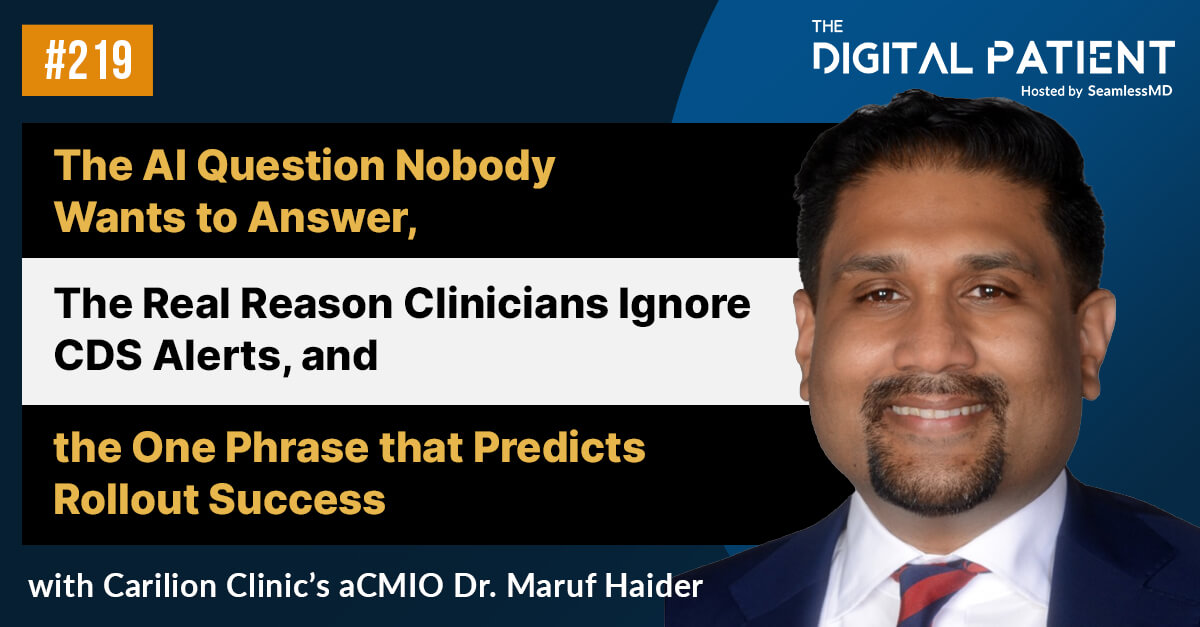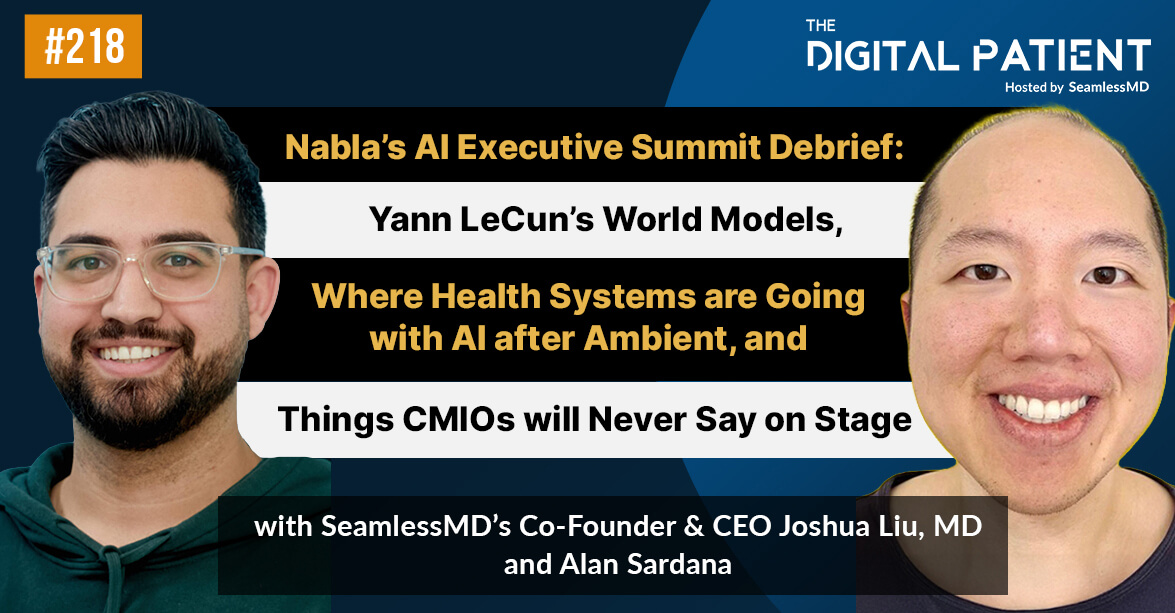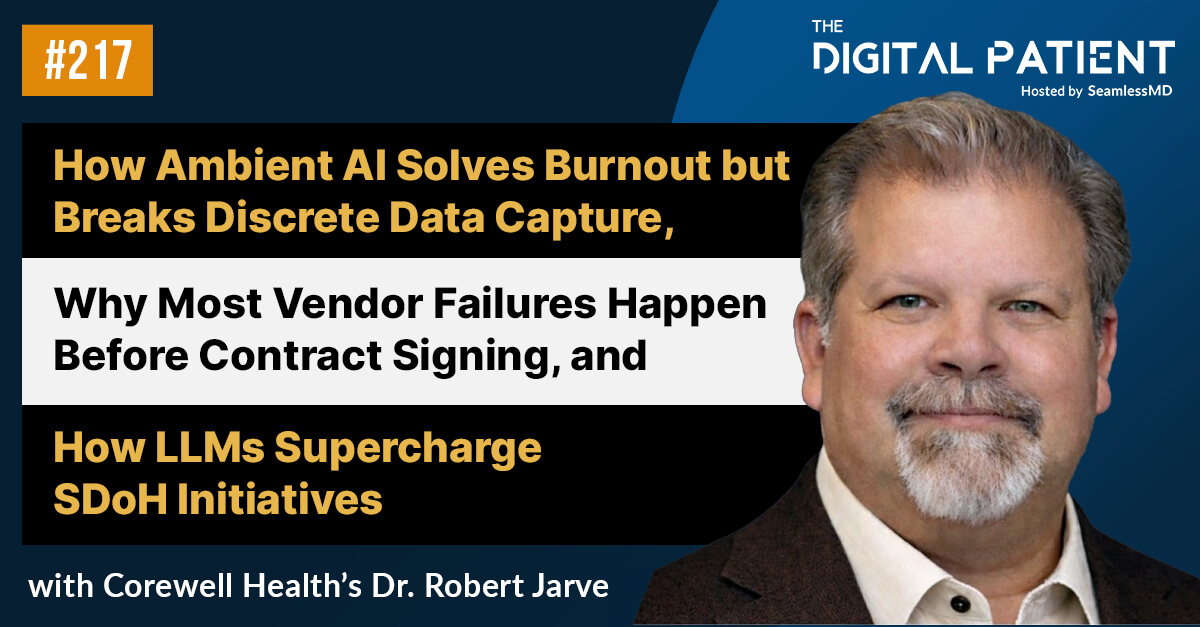Subscribe on: RSS | SPOTIFY | APPLE PODCAST | GOOGLE | BREAKER | ANCHOR
Video:
In this episode of the SeamlessMD Podcast, Dr. Joshua Liu, Co-founder & CEO at SeamlessMD, and marketing colleague, Alan Sardana, chat with Registered Cardiac Nurse and Patient Education Specialist, Ms. Therese Astillero, RN, MHI, about Using Digital Patient Engagement for Cardiac Surgery. See the full show notes below for details.
Guest(s): Ms. Therese Astillero, RN, MHI, Patient Education Specialist at SeamlessMD
Dr. Joshua Liu (@joshuapliu), Co-founder & CEO at SeamlessMD
Episode 14 – Show notes:
[00:20] Introducing Cardiac Nurse & Patient Education Specialist, Therese Astillero, RN, MHI;
[02:10] How Ms. Astillero’s frontline unit was often chosen to pilot new technology and processes at the hospital and why she decided to pursue a masters of health informatics to explore digital health further;
[04:53] Why having a clinical background is advantageous when working with clinical teams for the mutual understanding of processes and hardships in the hospital and how SeamlessMD operates similarly to a hospital with inter-professional and multi-disciplinary stakeholders such as Ms. Astillero, Cardiac RN now designing cardiac digital care plans;
[07:15] How Cardiac surgery patients know the heart is a vital organ and often require specific education related to their fear of the unknown such as 'How will the surgery go?’, ‘Will I make it out OK?’, ‘Will there be any complications?’, ‘Will I be able to get back to normal?’, ‘Will I have a new normal?’, and ‘How will the surgery affect my quality of life?’;
[08:35] How Cardiac surgery patient concerns vary by patient but revolves around topics important to them, and how Digital Patient Engagement addresses the specific topic – for example, regarding food and community, education includes topics such as ‘How do I reduce my salt intake while still making my food taste great?’ or ‘Can I still eat the food from my culture?’;
[13:13] How every patient is different - some experience overwhelm upon diagnosis and have difficulties processing new information and others want to know all of the information they can;
[14:45] How Ms. Astillero designs digital care plans using Universal Health Literacy Precautions which ensures patients get the right, bite-sized, information at a grade 6 or below reading-level in different formats (to-do list, education library, reminder text messages, etc.) so they can better understand and follow the information;
[17:00] How SeamlessMD uses patient characteristics to control what the patient will see/not see such as to 'stop taking this specific blood thinner’ (if a patient does not take the blood thinner, they would not receive the reminder) so that each patient has a unique and personalized experience;
[17:55] How SeamlessMD similarly modifies questions based on where the patient is – for e.g. if a patient is at home and encounters an issue while recovering, the platform can prompt the patient to call a specific provider, whereas if a patient is at a Skilled. Nursing Facility or rehab center, the platform can tell the patient to talk with their nurse (while alerting the nurse);
[19:20] How SeamlessMD enhances patient education and compliance with timed reminders and associated step-by-step education sent via SMS or email;
[21:30] How SeamlessMD asks probing questions to identify if a patient is experiencing cardiac pain vs incisional pain vs. other pain so it can appropriately deliver the right education for self-management or to escalate to the healthcare team and how the healthcare team has access to dashboards to see patient responses and the education they received remotely;
[26:11] Why Ms. Astillero believes it is important to track every patient since it is common for patients who appear stable to all of a sudden encounter problems after discharge;
[28:00] Why patients sometimes under-report symptoms or concerns so as to not take up physician time especially with minor problems such as constipation and how patients are often more honest when self-reporting through digital patient engagement because they do not feel like they are taking up staff time;
[31:00] How digital patient engagement provides a positive feedback loop for patients where they receive the right self-management education based on their self-reporting such as how to manage constipation and how digital patient engagement gives the clinical team an opportunity to reach out proactively if there is a larger concern;
[33:33] Why Ms. Astillero recommends still having patient follow-up calls while monitoring the patient on SeamlessMD to reassure the patient and for the human connection, but how 30-minute follow-up calls can be reduced to 5 minutes since the team sees all of the patient's responses and wound photos, etc.;
[36:03] How the digital programs on SeamlessMD (for e.g. the ERAS Cardiac surgery program) are routinely updated to include the latest evidence-based best practice such as adding prehab modules for patients;
[36:33] How Cardiac surgery patient feedback on SeamlessMD generally revolves around ‘Helping them stay on track’, Reassurance of what is normal/not normal’ and ‘Feeling connected to the care team’;
[37:37] Fast 5 / Lightning Round Questions:
Q: What is your favourite book?
A: Dr. Seuss’ Oh, the Places You’ll Go!
Q: Who is a person (dead or alive) you’d love to meet?
A: Steve Irwin.
Q: What is your favourite travel destination?
A: Top 3 (in no particular order): Australia, Curacao, and Amsterdam.
Q: What new hobbies/activities/skills have you picked up since COVID-19?
A: I am now a master barber.
Q: What is a story you’ve not shared publicly before?
A: I only applied to be a nurse to appease my mother. Though I was accepted to other programs, I decided to give it a try and it was the single best decision of my life so far.
.svg)









.png)
